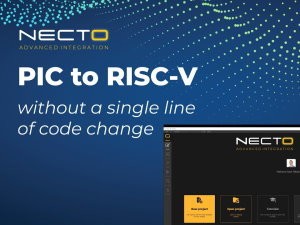Full RISC-V and CMake support added to powerful NECTO Studio 2.0 IDE from MIKROE

MikroElektronika, the embedded solutions company that dramatically cuts development time by providing innovative hardware and software products based on proven standards, today announced major upgrades to its NECTO™ Studio IDE. Version 2.0 adds full RISC-V support and CMake project-native support, plus significant Editor, Designer & Code Model improvements.
NECTO Studio 2.0 is a complete, cross-platform software development kit for embedded applications providing everything necessary to start developing, and prototyping, including Click™ board applications and GUIs for embedded devices. Rapid software development is easily achieved as developers do not need to consider low-level code, freeing them up to focus on the application code itself. This means that changing the MCU or even the whole platform does not require developers to redevelop their code for the new MCU or platform. They can simply switch to the desired platform, apply the correct board definition file, and the application code will continue to run after a single compiling.
RISC-V is becoming a big deal for embedded designers. MIKROE’s CEO, Nebojsa Matic, explains: “With its customizable open-source design and lack of licensing fees, RISC-V is gaining international traction. NECTO Studio 2.0 comes with natural support for GCC compilers for RISC-V. Currently we support over fourteen RISC-V MCUs, providing designers real choice. But we also support the RISC-V architecture in our mikroSDK, providing a whole set of mikroSDK 2.0 libraries for RISC-V, enabling designers to use all the Click libraries on RISC-V MCUs and easily to switch between different architectures without changing a single line of code.”
Following industry standards, NECTO Studio 2.0 has now uses the CMake build system. However, MIKROE has also added unique CMake features for adding files, removing files and renaming files for the CMake project, and adding/removing libraries from the CMake project. This means it is much easier and more intuitive to use with no steep learning curve.
Full details of further improvements are detailed here including more intuitive set-ups, Wizards, and project and library management options.
Users can also use the NECTO Studio 2.0 IDE to run Planet Debug, a hardware-as-a-service platform which enables designers to develop and debug embedded systems remotely without investing in hardware. For just $4/day, designers can reserve time on a remote Planet Debug station configured to their requirements, and develop and debug their own applications code remotely through NECTO Studio without having to source the hardware, wait for it to arrive and install and configure each element.




